Brandon Stanton's Blog, page 21
May 9, 2022
(7/12) “There were certain people in the building who weren’t...
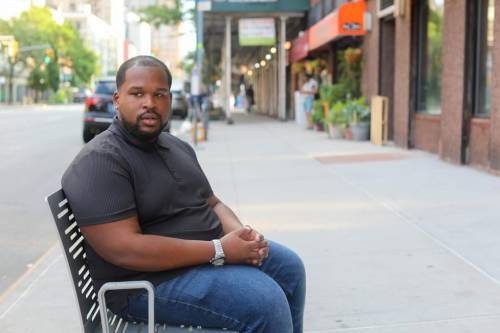
(7/12) “There were certain people in the building who weren’t happy about DiCo’s transition. They thought it was a distraction. When DiCo set up this after-school program for LGBT kids to come and talk, some people in the administration were like: ‘Hell no, not in the middle of Harlem.’ One of our assistant principals was a former deacon, and during a faculty meeting he mentioned ‘the homosexuality on the third floor.’ DiCo was the only gay person in the room. Even without all this extra stuff, DiCo’s transition would have been hard for anyone. He started walking around with a sad face all the time. But I never paid much attention, because I was so focused on myself. After Harvard I felt like I had something going. Next year I’d be old enough to be a captain, and our captains were getting full rides to Ivy League schools. I thought in two more years, that was going to be me. But this was also the year that Dr. Hodge retired, and things started to change at FDA. The debate team lost some of its funding. DiCo asked us to sell more chocolates. He was trying to get us to pick up the slack, but even he seemed less engaged. It’s not like he was saying ‘F these kids,’ or anything like that. But something was missing. DiCo had always been the kind of teacher who’d be enthusiastic at 6:30 AM. He was always giving us 150, but now he was giving us 90. And that wasn’t enough for me. I needed the world from DiCo. The moment he said: ‘I need a little bit more from you, I didn’t like it at all.’ One day we heard a rumor that a student had pushed DiCo down the stairs. DiCo never spoke to us about it, because he’s got this complex where he doesn’t want to see bad in anybody. But I’m pretty sure that’s when he made his decision. One afternoon he came into practice with his head down. He wasn’t looking anyone in the eye. Normally DiCo is so good with eye contact, so we knew something was up. He began to speak but he was stuttering. He looked like he was going to cry. I’m like: ‘Just say it DiCo, we can help you.’ I thought maybe someone had died or something. But then he cleared his throat, and said: ‘I’m leaving.’ And instantly I felt hate.”
(6/12) “I went running down the hall. I hadn’t even taken time...
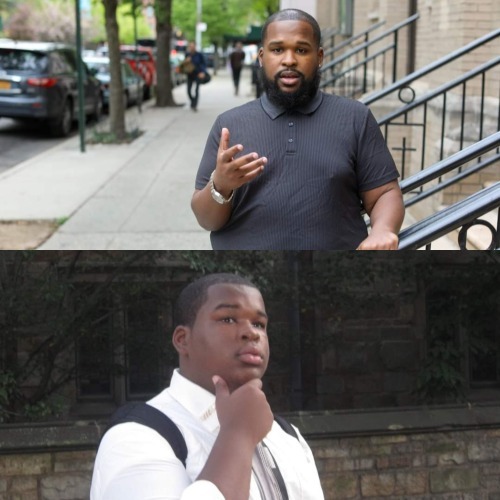
(6/12) “I went running down the hall. I hadn’t even taken time to zip up my backpack, so my papers were flying everywhere. I ended up finding DiCo in the cafeteria, and I told him what the judge had said to me. He was excited at first. But then he asked to see my scorecards, and that’s when his face changed. It started getting redder and redder. Even though I was winning, my scores were dropping each round. And all the judges were writing the same thing: ‘Jonathan needs to stick to the facts. His life story gives him an unfair advantage.’ DiCo didn’t like that at all. He told me that he was going to come watch my next round. This time I was competing against a kid from California. Another minion: khaki pants, white shirt, leather briefcase. And I ended up doing very well. I made all my points. And when the scores were being added up, both me and DiCo were feeling confident. But the judge finally stood up, and announced that I had lost. Honestly I didn’t care much. I was just happy that I’d made it so far. DiCo seemed happy too. But then he took a look at the scorecard, and it said the same shit: ‘Jonathan used his personal story too much.’ And that’s when DiCo snapped. When DiCo snaps, it ain’t like reality TV. It’s beautiful. It’s the most articulate disrespect ever. He’s using all these big words. He’s asking questions, just like he taught us. He’s saying things like: ‘You will not do this to him. These rich kids have access to every resource. But you’re penalizing Jonathan because his life is fucked up?’ But DiCo isn’t doing everything that he taught us. He always told us to control our emotions. But DiCo was getting pissed. He smacked the scorecard down on the table. He’s twitching. I think he might have called the judge a racist. I started laughing, because DiCo was acting crazy. But that made DiCo even more mad. He didn’t even speak to me when we walked out of the room. But that night when we were packing up our hotel, he was like: ‘Why aren’t you more angry? You worked so hard for this.’ And I’m like: ‘I dunno, DiCo. This is normal life for me.’ And he’s like: ‘Well, you better start caring more. Or this is going to be your life forever.’”
(5/12) “On the bus to Harvard we were cutting ass. Maybe a...
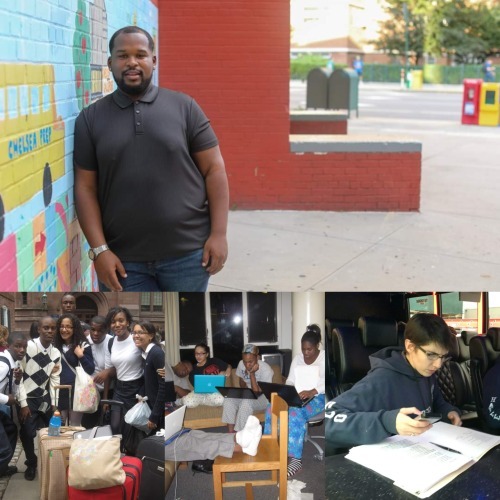
(5/12) “On the bus to Harvard we were cutting ass. Maybe a couple of the seniors were stressed. But the rest of us were laughing and making clown faces. That’s one beautiful thing I’ve learned in life: if your expectations are low enough, you can be completely free. I went into every tournament thinking: ‘This is impossible.’ We knew we were never going to beat these rich kids. As soon as we stepped off the bus, everyone was looking at us. It’s not every day you see a transgender teacher with all these big ass black kids. And it was very obvious that we poor. Everyone else was wearing ironed dress shirts and khakis. We’ve got plain white tees and sandals. DiCo’s trying to help us tie our ties. It was embarrassing. It’s like, c’mon DiCo. You just became a guy. Now you’re tying our ties in front of all these white people. The first place we went was the cafeteria for lunch. All these other kids were looking at their notes, and talking about their topics. We’re giving piggy-back rides and talking about Lebron. DiCo tried his best to make us focus. He’d be like: ‘C’mon guys, this is serious stuff.’ But we weren’t hearing it. On the first day DiCo was mainly watching the older kids. I was in in there all by myself, but I’m killing it. There was nothing too special about my speech. Everyone had been studying the same articles, so we were using the same facts. But at the end of every round there’s this thing called ‘Cross X,’ when you get to ask your opponent questions. And that’s when I shined. I’d talk about Koreh. I never said his name, because you can’t use names. But I’d ask if they knew what it was like to grow up without a mom or dad. Or if they’d ever eaten potato chips for dinner. I’d say: ‘‘Do you know anyone who’s been personally affected by the justice system?’’ And when they said ‘no,’ I’d be like: ‘Maybe you’re not the best one to be making this argument.’ I ended up making it past the first round. Then the second. I’m still thinking that I don’t have a chance. But after the third round, one of the judges pulled me aside. He was like: ‘You need to slow down. And have a bit more sportsmanship. But if you don’t win, this tournament is rigged.’”
(4/12) “One night I was at a talent show in the Bronx. And...
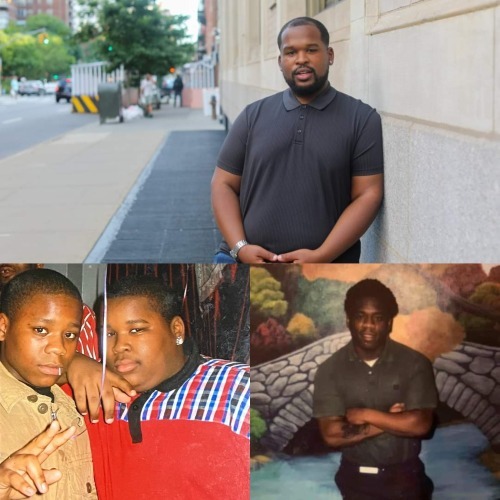
(4/12) “One night I was at a talent show in the Bronx. And somebody came up behind me and grabbed the back of my head. It was Koreh. It had been almost a year since I’d seen him, and he’d changed. His voice was deeper. I could feel the presence of the people he was with. It felt like he had power. Growing up he’d never taken himself seriously. He was always dancing in class, or blurting out something stupid. The teachers gave him warning after warning. My grandmother always told me that he was a bad influence. But to be honest, she loved him too. She’d invite him in her apartment, and feed him. He’d kiss her hand. He’d be like: ‘You’re so beautiful Ms. Smith, can we read the Bible together?’ Koreh didn’t care nothing about God. But he’d turn on some gospel music, and grab the tambourine. Sometimes he would overplay. I remember one day he called Ms. Brown a ‘B,’ and the school called his emergency contact number. This tall black dude showed up and smacked the shit out of him. Right in front of everybody. I’d never seen this guy before. I’d been to Koreh’s apartment a lot of times, and I ain’t never even seen an adult. It was a potato-chips-for-dinner type situation. There were no rules. Koreh never had a curfew. If I was ever out after dark, my grandmother would come looking for me. But nobody ever came looking for Koreh. One time he stopped coming to school for a few weeks. None of us knew where he was. And when he finally came back, he told me that he’d gone to his mother’s funeral in South Carolina. He wasn’t bawling, but there were tears in his eyes. We never really talked about it again, but after that day Koreh kinda turned into a monster. It seemed like every year he’d take more and more risks. He was always involved in some kind of situation. He tried his best to keep me out of it. Even when he was selling drugs with his cousins, he’d be like: ‘Leave Jon alone. Jon’s gonna be somebody.’ But a lot of times I couldn’t help but get involved, cause we was always together. Like that time in eighth grade when we were walking down the street, and we saw this house. And Koreh’s like: ‘Yo, let’s break in.’ And I’m stupid, so I agreed.”
(3/12) “We did notice certain changes as the year went on. Ms....
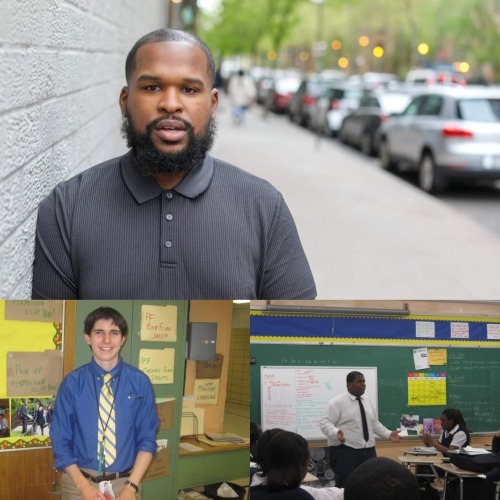
(3/12) “We did notice certain changes as the year went on. Ms. DiCo’s voice got deeper and deeper. Her hair got shorter and shorter. But I didn’t think much of it. To be honest I wasn’t thinking much about Ms. DiCo at all. She was white, from Manhattan. She’d gone to Yale. I just assumed she didn’t have any problems. But one morning Ms. DiCo came into class with a fresh cut, and a full suit. She seemed nervous. She walked up to the front of the room, and said: ‘This is who I am. And I hope you’ll accept me. You don’t have to call me Mr. DiCo. But I’d prefer if you don’t call me Ms. DiCo. Just call me DiCo.’ Even today I thank God that DiCo was the first person I met who was transgender. This was the only person who really loved and understood me. DiCo could have told me he was a dinosaur, and I’d be like: ‘That’s cool. Just stay DiCo.’ And the rest of the team felt the same way. A couple of the seniors gave him a hug, but then we just got back to debate. The Harvard Tournament was coming up, and it was the biggest thing we did all year. We had to sell chocolate bars just to get there. We got to stay in a hotel for three nights. It was a big deal. The topic for this year’s tournament was: ‘Should juvenile defenders be tried as adults?’ DiCo was smiling at me when he hung the topic up on the wall. He knew about my situation with Koreh. I think he thought that this would be the tournament that finally got me to focus. I started coming in early each day so we could work on my speech together. We went through a big stack of articles. We memorized the facts and statistics. And we worked on weaving in my personal story. During practice DiCo kept pushing me to the front of the class, and I destroyed. I had my speech down. I even cried a couple times, because I loved Koreh. And I wanted to prove it wasn’t fair what happened to him. At one point DiCo even got up to debate me, which never happens. And he demolishes me. I’m stuttering, I’m struggling. It was like practicing against Tom Brady, and it pissed me off. I was like: ‘Why is DiCo doing this to me?’ But after class he pulled me aside, and said: ‘You could be the first kid I’ve had that wins at Harvard.’”
March 28, 2022
(4/4) “In the early days Kristen and I would write every single...

(4/4) “In the early days Kristen and I would write every single email together. We’d type them together, and hit send together, normally late at night, over a glass of wine. Everything felt so important. All we had was this crazy idea. But we believed in it so hard, and we kept shouting it from the rooftops until other people believed in it too. It’s been five years now. And Paladin is one of the first successful justice tech companies. Dozens of top law firms use our product. The business is working. But it’s so much more than a business. A law firm that uses Paladin will increase its pro-bono cases by an average of 30 percent in the first year. We’ve connected over 20,000 lawyers with low-income clients who need help. And it all came from a crazy idea that we had on the floor of a tent. That’s what I’m best at: ideas. I’m a philosophy major. I love to daydream. But Paladin isn’t about the idea anymore; it’s about the execution. And that’s where KBad really shines. I led the charge for five years, but Kristen is our CEO now. She’s our leader. And I want her to be so successful, and happy, and celebrated. She was chosen recently as a Crain’s 40 under 40. It’s a really big deal, and she deserves all of it. I know because I’ve had a front row seat to how amazing she is. That’s been the biggest gift of Paladin, beyond the impact. I didn’t come into this looking for friendship, but Kristen and I have become as close as two people can be who aren’t related or married. We built a business together. We became mothers while doing it. We’ve watched each other grow so much. Last week I was looking through some old photos, and I came across our very first Paladin headshots. We took them in the hallway with my camera. We had such baby faces. We had no clue how hard it was going to be. But we’d decided that we were going to take the reins of life and see what was possible. We had this crazy dream to make the world a fairer place. It wasn’t a normal dream, to become a doctor or a lawyer. It was our specific dream. And you know what? It worked. The crazy dream worked. We built a justice machine.”
(¾) “Both of us quit our jobs. It was nerve-wracking. I...
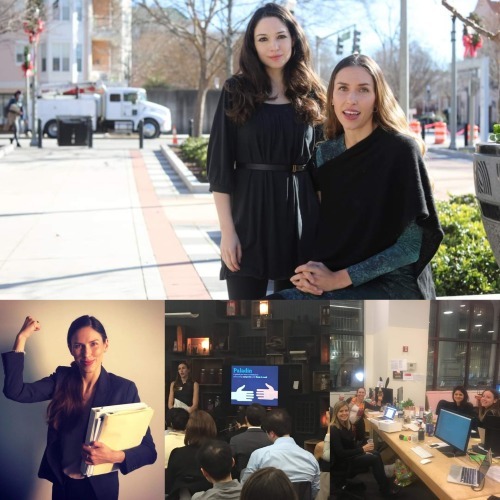
(¾) “Both of us quit our jobs. It was nerve-wracking. I remember on the first day I wore a suit. We were meeting in a coffee shop, but I wore a suit. Because I wanted to feel like we were doing something real. There was a lot of vision boarding. And sticky notes of different colors. We only had the vaguest idea of what we were going to build. Was it a business? Or a non-profit? Maybe it could be a hybrid. If we could make ‘pro bono’ easier, then law firms would pay for the service. We could use those profits to scale. And the bigger we grew, the more free legal services we’d generate for low-income communities. It really would be a justice machine. We chose the company name out of a thesaurus at 2 AM. ‘Paladin’ is an old word, meaning ‘knight of the round table’ And that’s how we wanted lawyers to see themselves: as guardians of justice. In the beginning Kristen and I were trying so hard to impress each other. I did my best to act confident, but secretly I’d be Googling: ‘How to start a company. How to be a CEO.’ We told everyone that we had ‘discovered a better way to do pro-bono matching.’ But the first version of Paladin was a janky Google survey. We sent it to all our lawyer friends, and did the matching by hand. Over time it got more and more refined. We hired some talented programmers to automate things. But even after Paladin was working perfectly, it was hard to get law firms to try something new. It’s not like we were selling cloud storage. We were selling justice, and impact. But we still had to sell. And it was hard. We’d go to these legal conferences and make our pitch, but everyone told us: ‘Not now.’ Or ‘come back later.’ After a few months the initial excitement had worn off. We were in that middle zone— when you’ve already sunk in so much time, but nothing seems to be working. Most people lose focus in the middle zone. But that’s when Kristen comes alive. She goes into turbo mode. She becomes KBad. When KBad hears a ‘no,’ she’s energized by it. KBad is like that person who cuts down trees. What’s that called? A lumberjack. I’m more of a carpenter. I polish things, and refine them. But KBad hacks through things. KBad is a lumberjack.”
(2/4) “A few months after Eduardo’s case I went to a music...
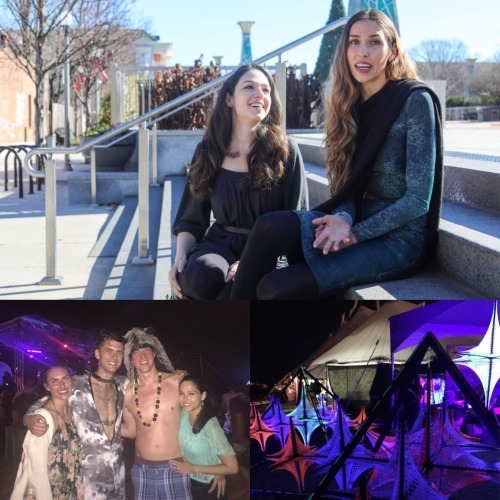
(2/4) “A few months after Eduardo’s case I went to a music festival. It wasn’t normally my kind of scene. It was on the Jersey Shore. There were a lot of glowsticks and temporary tattoos. But I was twenty-six. I had to do something on the weekends. Everyone in my group seemed to know each other except for me and a girl named Kristen. We were the ‘bring-alongs,’ so we kinda got stuck together. Kristen’s only 5’3”. And she’s soft-spoken. But I soon learned that there’s a really big person packed in that small body. Her friends call her ‘KBad’ for a reason. She studied political science at Princeton. She spent two years in Mexico working for the DOJ. And she’s really, really passionate about changing the world. We did the dancy thing for awhile. But after dark the festival turned into a techno rave kind of situation: fire dancers, light show, the whole thing. Kristen and I ended up finding a tent outside the main action, with an opium den vibe. There were lots of Moroccan throw pillows. We laid down on the plush red carpet, and our conversations got pretty deep, pretty quick. At some point I told her the story of Eduardo’s case. I explained that it had opened my eyes to the power of ‘pro-bono’ work. Pro-bono means ‘for the public good.’ It’s essentially community service, and every lawyer is supposed to do 50 hours per year. But it’s a frustrating process. The system is email-based. It’s outdated, and disorganized. There are millions of low-income people who need legal services, but it can be hard to find the right case. So many lawyers just give up. I asked Kristen: ‘What if we invented a better system? If we could increase ‘pro bono’ hours by even 10 percent, that would be 6.5 million hours of free legal services.’ We could create a justice machine. We went back-and-forth until 4 AM. Honestly I thought we were just riffing. But two weeks later I got an email from Kristen. It was a pitch on why we should work together. God, it was so ‘KBad.’ It included a 14-page powerpoint, and each slide featured one of her skills. Later that week we scheduled a call, and we had a negotiation. It was a done deal. We were definitely going to do this. Whatever this is.”
(¼) “Eduardo was so nervous when he came into our office....

(¼) “Eduardo was so nervous when he came into our office. He barely spoke English, so he told his story through an interpreter. He explained that his hometown in Colombia had been taken over by guerillas. He’d been beaten. His family was threatened. And he escaped to America to apply for asylum. He kept thanking us over and over for taking his case. I was grateful to him as well. He was the first actual person I’d ever represented. I was fresh out of law school. I was working at a major law firm, and already I was feeling disconnected. Our clients were abstractions: corporations and countries. In school I’d dreamed about helping people, but my job mostly involved doing research. Eduardo was the first ‘pro bono’ case I’d ever done. I wasn’t getting paid, but it felt meaningful. And it was a lot of pressure. Because I knew that if we failed, Eduardo would be deported, and he could be killed. My partner and I did a series of all-nighters to prepare. So much of the law is in the details: getting documents in order, meeting deadlines. But it can seem impossible unless you know what you’re doing. On the day of his court appearance Eduardo was a nervous wreck. The court building itself can seem like a terrifying, hostile place. You have to go through security. Everything is made of marble. The judge is dressed in robes, and positioned higher than everyone else. Eduardo stuttered through his entire testimony. He misspoke a couple times, and the judge snapped at him. But we were by his side the whole time, stating the evidence, arguing on his behalf. When we were finished the judge took a long pause. She said: ‘It’s really close,’ and all of us held our breath. Then she said: ‘Asylum granted.’ We shuffled out of the courtroom as quickly as possible. Eduardo’s family was waiting in the next room. There were hugs, and tears, and disbelief. He wanted to thank us somehow, so he took us to the McDonalds across the street. I’m a vegetarian. So normally that would be my worst nightmare, but I ordered some French fries. And those were the best French fries I’ve ever had in my life. This was the feeling I’d been imagining in law school. I felt like I’d unlocked a superpower.”
March 3, 2022
(13/13) “Right before Tripp went to prison I sat the kids down...
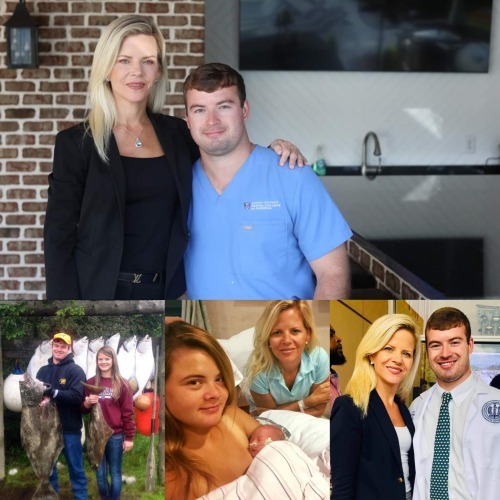
(13/13) “Right before Tripp went to prison I sat the kids down one-by-one. I told them that they were loved, and they were chosen. But they were conceived by a sperm donor. I thought it was going to be hard on them. But they were happy. The first thing they said was: ‘You mean we don’t have his genes?’ All of them have grown into such great people. We have our good weeks. And our bad weeks. Life wasn’t finished giving us surprises. I’ve had another marriage. And another daughter. I now have two beautiful twin granddaughters running around the house. Last night all my kids came over for dinner. We were together in the living room, talking and laughing. That’s still my biggest joy: watching these people love each other, helping them navigate through life. Elle needs to get her grades up, so I took her phone away. She was tickling me, trying to get it back. Charles was begging me to take him to Hobby Lobby, because he’s got his first girlfriend. He wants to make her a bracelet. John still drives his sisters crazy. They’re always complaining that he’s acting like their dad. He drives me crazy too. I’ll have just finished making dinner, and he’ll say: ‘Have you gone over Charles’ spelling words?’ It’s like: ‘Can I ever take a break?’ But I couldn’t have done this without him. One time I asked him: ‘John, what makes you so good?’’ He told me: ‘I saw how Dad treated you. And I never wanted to hurt you like he did.’ John graduates from dental school in May. He was elected president of his class, so he gave a speech at the induction ceremony. There were hundreds of people in attendance: all the students, all their families. John was the last one to speak. He thanked all his teachers, one by one. Then he pointed over to where I was sitting. He said: ‘Mom, can you please stand up?’ I had no idea what was going on, but I stood up. Everyone turned to look at me. And John said: ‘Mom, you’re the reason I’m here. You’ve taught me to push myself to limits I’ve never dreamed possible. When everyone threw in the towel on our family, you persisted. And you were everything we needed you to be. I don’t have a coffee mug to give you– but you’re the number one Mom in the world.”
Brandon Stanton's Blog
- Brandon Stanton's profile
- 768 followers



